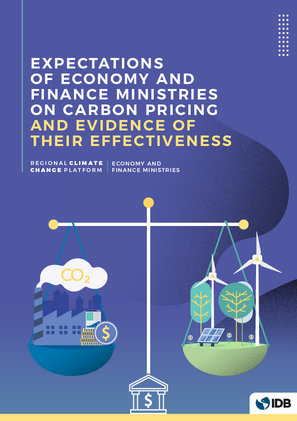Expectations of Economy and Finance Ministries on Carbon Pricing and Evidence of their Effectiveness
Date
Mar 2024
This document analyzes the expectations and objectives of the Ministries of Finance, Economy, and Finance of Latin America and the Caribbean regarding implementing carbon pricing mechanisms. It contrasts it with existing evidence regarding these instruments.
Twelve qualitative interviews were conducted with specialists from ministries in the region, revealing that countries mainly adopted these instruments to support climate policy. To do so, ministries seek, in some cases, for these instruments to incentivize emissions reduction or, in other cases, to meet fiscal and investment mobilization goals for climate action.
While countries have positive expectations about their effectiveness in reducing emissions, they still need to evaluate their performance. The analysis of existing evidence concludes that carbon pricing implemented to date has had modest effects on emissions, with multiple barriers preventing them from reaching their theoretical potential. However, if these instruments are well-designed, they can be complementary tools to support decarbonization efforts, as they cannot catalyze the necessary structural transformations independently. Therefore, the recommendation is to include them in a broader set of climate policies, mitigate their distributive effects, evaluate their outcomes, and strengthen the technical capacities of ministries.
Twelve qualitative interviews were conducted with specialists from ministries in the region, revealing that countries mainly adopted these instruments to support climate policy. To do so, ministries seek, in some cases, for these instruments to incentivize emissions reduction or, in other cases, to meet fiscal and investment mobilization goals for climate action.
While countries have positive expectations about their effectiveness in reducing emissions, they still need to evaluate their performance. The analysis of existing evidence concludes that carbon pricing implemented to date has had modest effects on emissions, with multiple barriers preventing them from reaching their theoretical potential. However, if these instruments are well-designed, they can be complementary tools to support decarbonization efforts, as they cannot catalyze the necessary structural transformations independently. Therefore, the recommendation is to include them in a broader set of climate policies, mitigate their distributive effects, evaluate their outcomes, and strengthen the technical capacities of ministries.
Generative AI enabled





